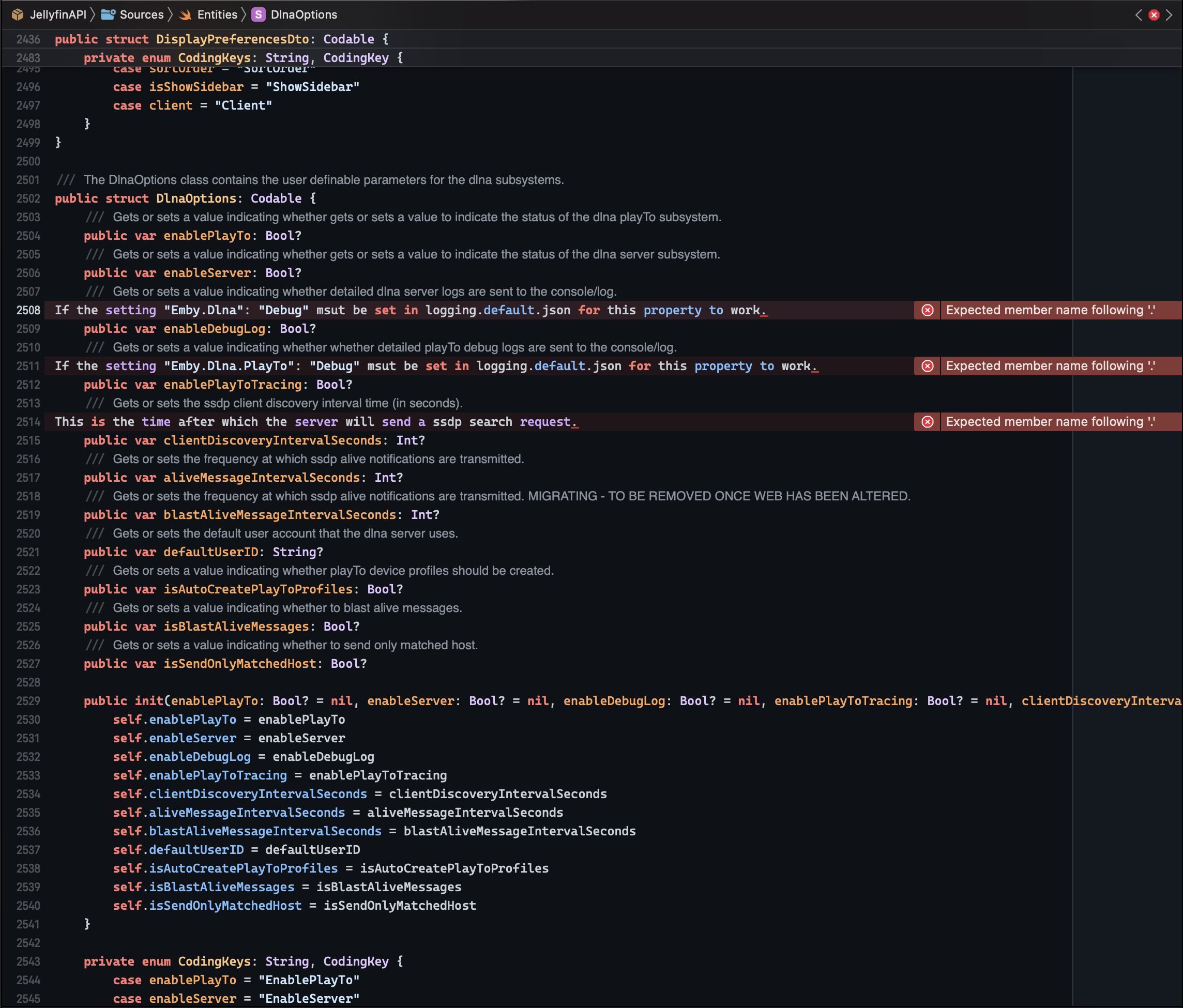avanderlee@Antoines-MBP-2 OpenAPI % create-api generate app_store_connect_api_2.0_openapi.json --module "AppStoreConnect_Swift_SDK" --output . --config .create-api.yml -s
Generating code for app_store_connect_api_2.0_openapi.json...
WARNING: Unknown body content types: [OpenAPIKitCore.OpenAPI.ContentType(underlyingType: OpenAPIKitCore.OpenAPI.ContentType.Builtin.other("application/a-gzip"), warnings: [], parameters: [:])], defaulting to Data. Use paths.overridenBodyTypes to add support for your content types.
WARNING: Unknown body content types: [OpenAPIKitCore.OpenAPI.ContentType(underlyingType: OpenAPIKitCore.OpenAPI.ContentType.Builtin.other("application/a-gzip"), warnings: [], parameters: [:])], defaulting to Data. Use paths.overridenBodyTypes to add support for your content types.
WARNING: Unknown body content types: [OpenAPIKitCore.OpenAPI.ContentType(underlyingType: OpenAPIKitCore.OpenAPI.ContentType.Builtin.other("application/vnd.apple.xcode-metrics+json"), warnings: [], parameters: [:])], defaulting to Data. Use paths.overridenBodyTypes to add support for your content types.
WARNING: Unknown body content types: [OpenAPIKitCore.OpenAPI.ContentType(underlyingType: OpenAPIKitCore.OpenAPI.ContentType.Builtin.other("application/vnd.apple.xcode-metrics+json"), warnings: [], parameters: [:])], defaulting to Data. Use paths.overridenBodyTypes to add support for your content types.
WARNING: Unknown body content types: [OpenAPIKitCore.OpenAPI.ContentType(underlyingType: OpenAPIKitCore.OpenAPI.ContentType.Builtin.other("application/vnd.apple.diagnostic-logs+json"), warnings: [], parameters: [:])], defaulting to Data. Use paths.overridenBodyTypes to add support for your content types.
Error: Failed to generate get for Operation(tags: Optional(["SubscriptionOfferCodeOneTimeUseCodes"]), summary: nil, description: nil, externalDocs: nil, operationId: Optional("subscriptionOfferCodeOneTimeUseCodes-get_instance"), parameters: [Either(Parameter(name: "fields[subscriptionOfferCodeOneTimeUseCodes]", context: (extension in OpenAPIKit30):OpenAPIKitCore.OpenAPI.Parameter.Context.query(required: false, allowEmptyValue: false), description: Optional("the fields to include for returned resources of type subscriptionOfferCodeOneTimeUseCodes"), deprecated: false, schemaOrContent: Either(SchemaContext(style: (extension in OpenAPIKit30):OpenAPIKitCore.OpenAPI.Parameter.SchemaContext.Style.form, explode: false, allowReserved: false, schema: Either(JSONSchema(warnings: [], value: OpenAPIKit30.JSONSchema.Schema.array(OpenAPIKit30.JSONSchema.CoreContext<OpenAPIKit30.JSONTypeFormat.ArrayFormat>(format: OpenAPIKit30.JSONTypeFormat.ArrayFormat.generic, required: true, _nullable: nil, _permissions: nil, _deprecated: nil, title: nil, description: nil, externalDocs: nil, discriminator: nil, allowedValues: nil, defaultValue: nil, example: nil), OpenAPIKit30.JSONSchema.ArrayContext(items: Optional(OpenAPIKit30.JSONSchema(warnings: [], value: OpenAPIKit30.JSONSchema.Schema.string(OpenAPIKit30.JSONSchema.CoreContext<OpenAPIKit30.JSONTypeFormat.StringFormat>(format: OpenAPIKit30.JSONTypeFormat.StringFormat.generic, required: true, _nullable: nil, _permissions: nil, _deprecated: nil, title: nil, description: nil, externalDocs: nil, discriminator: nil, allowedValues: Optional([AnyCodable("active"), AnyCodable("createdDate"), AnyCodable("expirationDate"), AnyCodable("numberOfCodes"), AnyCodable("offerCode"), AnyCodable("values")]), defaultValue: nil, example: nil), OpenAPIKit30.JSONSchema.StringContext(maxLength: nil, _minLength: nil, pattern: nil)))), maxItems: nil, _minItems: nil, _uniqueItems: nil)))), example: nil, examples: nil)), vendorExtensions: [:])), Either(Parameter(name: "include", context: (extension in OpenAPIKit30):OpenAPIKitCore.OpenAPI.Parameter.Context.query(required: false, allowEmptyValue: false), description: Optional("comma-separated list of relationships to include"), deprecated: false, schemaOrContent: Either(SchemaContext(style: (extension in OpenAPIKit30):OpenAPIKitCore.OpenAPI.Parameter.SchemaContext.Style.form, explode: false, allowReserved: false, schema: Either(JSONSchema(warnings: [], value: OpenAPIKit30.JSONSchema.Schema.array(OpenAPIKit30.JSONSchema.CoreContext<OpenAPIKit30.JSONTypeFormat.ArrayFormat>(format: OpenAPIKit30.JSONTypeFormat.ArrayFormat.generic, required: true, _nullable: nil, _permissions: nil, _deprecated: nil, title: nil, description: nil, externalDocs: nil, discriminator: nil, allowedValues: nil, defaultValue: nil, example: nil), OpenAPIKit30.JSONSchema.ArrayContext(items: Optional(OpenAPIKit30.JSONSchema(warnings: [], value: OpenAPIKit30.JSONSchema.Schema.string(OpenAPIKit30.JSONSchema.CoreContext<OpenAPIKit30.JSONTypeFormat.StringFormat>(format: OpenAPIKit30.JSONTypeFormat.StringFormat.generic, required: true, _nullable: nil, _permissions: nil, _deprecated: nil, title: nil, description: nil, externalDocs: nil, discriminator: nil, allowedValues: Optional([AnyCodable("offerCode")]), defaultValue: nil, example: nil), OpenAPIKit30.JSONSchema.StringContext(maxLength: nil, _minLength: nil, pattern: nil)))), maxItems: nil, _minItems: nil, _uniqueItems: nil)))), example: nil, examples: nil)), vendorExtensions: [:])), Either(Parameter(name: "fields[subscriptionOfferCodeOneTimeUseCodeValues]", context: (extension in OpenAPIKit30):OpenAPIKitCore.OpenAPI.Parameter.Context.query(required: false, allowEmptyValue: false), description: Optional("the fields to include for returned resources of type subscriptionOfferCodeOneTimeUseCodeValues"), deprecated: false, schemaOrContent: Either(SchemaContext(style: (extension in OpenAPIKit30):OpenAPIKitCore.OpenAPI.Parameter.SchemaContext.Style.form, explode: false, allowReserved: false, schema: Either(JSONSchema(warnings: [], value: OpenAPIKit30.JSONSchema.Schema.array(OpenAPIKit30.JSONSchema.CoreContext<OpenAPIKit30.JSONTypeFormat.ArrayFormat>(format: OpenAPIKit30.JSONTypeFormat.ArrayFormat.generic, required: true, _nullable: nil, _permissions: nil, _deprecated: nil, title: nil, description: nil, externalDocs: nil, discriminator: nil, allowedValues: nil, defaultValue: nil, example: nil), OpenAPIKit30.JSONSchema.ArrayContext(items: Optional(OpenAPIKit30.JSONSchema(warnings: [], value: OpenAPIKit30.JSONSchema.Schema.string(OpenAPIKit30.JSONSchema.CoreContext<OpenAPIKit30.JSONTypeFormat.StringFormat>(format: OpenAPIKit30.JSONTypeFormat.StringFormat.generic, required: true, _nullable: nil, _permissions: nil, _deprecated: nil, title: nil, description: nil, externalDocs: nil, discriminator: nil, allowedValues: Optional([]), defaultValue: nil, example: nil), OpenAPIKit30.JSONSchema.StringContext(maxLength: nil, _minLength: nil, pattern: nil)))), maxItems: nil, _minItems: nil, _uniqueItems: nil)))), example: nil, examples: nil)), vendorExtensions: [:]))], requestBody: nil, responses: OpenAPIKitCore.OrderedDictionary<(extension in OpenAPIKit30):OpenAPIKitCore.OpenAPI.Response.StatusCode, OpenAPIKitCore.Either<OpenAPIKit30.JSONReference<(extension in OpenAPIKit30):OpenAPIKitCore.OpenAPI.Response>, (extension in OpenAPIKit30):OpenAPIKitCore.OpenAPI.Response>>(orderedKeys: [(extension in OpenAPIKit30):OpenAPIKitCore.OpenAPI.Response.StatusCode(warnings: [], value: (extension in OpenAPIKit30):OpenAPIKitCore.OpenAPI.Response.StatusCode.Code.status(code: 400)), (extension in OpenAPIKit30):OpenAPIKitCore.OpenAPI.Response.StatusCode(warnings: [], value: (extension in OpenAPIKit30):OpenAPIKitCore.OpenAPI.Response.StatusCode.Code.status(code: 403)), (extension in OpenAPIKit30):OpenAPIKitCore.OpenAPI.Response.StatusCode(warnings: [], value: (extension in OpenAPIKit30):OpenAPIKitCore.OpenAPI.Response.StatusCode.Code.status(code: 404)), (extension in OpenAPIKit30):OpenAPIKitCore.OpenAPI.Response.StatusCode(warnings: [], value: (extension in OpenAPIKit30):OpenAPIKitCore.OpenAPI.Response.StatusCode.Code.status(code: 200))], unorderedHash: [(extension in OpenAPIKit30):OpenAPIKitCore.OpenAPI.Response.StatusCode(warnings: [], value: (extension in OpenAPIKit30):OpenAPIKitCore.OpenAPI.Response.StatusCode.Code.status(code: 400)): Either(Response(description: "Parameter error(s)", headers: nil, content: OpenAPIKitCore.OrderedDictionary<OpenAPIKitCore.OpenAPI.ContentType, (extension in OpenAPIKit30):OpenAPIKitCore.OpenAPI.Content>(orderedKeys: [OpenAPIKitCore.OpenAPI.ContentType(underlyingType: OpenAPIKitCore.OpenAPI.ContentType.Builtin.json, warnings: [], parameters: [:])], unorderedHash: [OpenAPIKitCore.OpenAPI.ContentType(underlyingType: OpenAPIKitCore.OpenAPI.ContentType.Builtin.json, warnings: [], parameters: [:]): (extension in OpenAPIKit30):OpenAPIKitCore.OpenAPI.Content(schema: Optional(Either(internal(#/components/schemas/ErrorResponse))), example: nil, examples: nil, encoding: nil, vendorExtensions: [:])], _warnings: []), links: OpenAPIKitCore.OrderedDictionary<Swift.String, OpenAPIKitCore.Either<OpenAPIKit30.JSONReference<(extension in OpenAPIKit30):OpenAPIKitCore.OpenAPI.Link>, (extension in OpenAPIKit30):OpenAPIKitCore.OpenAPI.Link>>(orderedKeys: [], unorderedHash: [:], _warnings: []), vendorExtensions: [:])), (extension in OpenAPIKit30):OpenAPIKitCore.OpenAPI.Response.StatusCode(warnings: [], value: (extension in OpenAPIKit30):OpenAPIKitCore.OpenAPI.Response.StatusCode.Code.status(code: 403)): Either(Response(description: "Forbidden error", headers: nil, content: OpenAPIKitCore.OrderedDictionary<OpenAPIKitCore.OpenAPI.ContentType, (extension in OpenAPIKit30):OpenAPIKitCore.OpenAPI.Content>(orderedKeys: [OpenAPIKitCore.OpenAPI.ContentType(underlyingType: OpenAPIKitCore.OpenAPI.ContentType.Builtin.json, warnings: [], parameters: [:])], unorderedHash: [OpenAPIKitCore.OpenAPI.ContentType(underlyingType: OpenAPIKitCore.OpenAPI.ContentType.Builtin.json, warnings: [], parameters: [:]): (extension in OpenAPIKit30):OpenAPIKitCore.OpenAPI.Content(schema: Optional(Either(internal(#/components/schemas/ErrorResponse))), example: nil, examples: nil, encoding: nil, vendorExtensions: [:])], _warnings: []), links: OpenAPIKitCore.OrderedDictionary<Swift.String, OpenAPIKitCore.Either<OpenAPIKit30.JSONReference<(extension in OpenAPIKit30):OpenAPIKitCore.OpenAPI.Link>, (extension in OpenAPIKit30):OpenAPIKitCore.OpenAPI.Link>>(orderedKeys: [], unorderedHash: [:], _warnings: []), vendorExtensions: [:])), (extension in OpenAPIKit30):OpenAPIKitCore.OpenAPI.Response.StatusCode(warnings: [], value: (extension in OpenAPIKit30):OpenAPIKitCore.OpenAPI.Response.StatusCode.Code.status(code: 404)): Either(Response(description: "Not found error", headers: nil, content: OpenAPIKitCore.OrderedDictionary<OpenAPIKitCore.OpenAPI.ContentType, (extension in OpenAPIKit30):OpenAPIKitCore.OpenAPI.Content>(orderedKeys: [OpenAPIKitCore.OpenAPI.ContentType(underlyingType: OpenAPIKitCore.OpenAPI.ContentType.Builtin.json, warnings: [], parameters: [:])], unorderedHash: [OpenAPIKitCore.OpenAPI.ContentType(underlyingType: OpenAPIKitCore.OpenAPI.ContentType.Builtin.json, warnings: [], parameters: [:]): (extension in OpenAPIKit30):OpenAPIKitCore.OpenAPI.Content(schema: Optional(Either(internal(#/components/schemas/ErrorResponse))), example: nil, examples: nil, encoding: nil, vendorExtensions: [:])], _warnings: []), links: OpenAPIKitCore.OrderedDictionary<Swift.String, OpenAPIKitCore.Either<OpenAPIKit30.JSONReference<(extension in OpenAPIKit30):OpenAPIKitCore.OpenAPI.Link>, (extension in OpenAPIKit30):OpenAPIKitCore.OpenAPI.Link>>(orderedKeys: [], unorderedHash: [:], _warnings: []), vendorExtensions: [:])), (extension in OpenAPIKit30):OpenAPIKitCore.OpenAPI.Response.StatusCode(warnings: [], value: (extension in OpenAPIKit30):OpenAPIKitCore.OpenAPI.Response.StatusCode.Code.status(code: 200)): Either(Response(description: "Single SubscriptionOfferCodeOneTimeUseCode", headers: nil, content: OpenAPIKitCore.OrderedDictionary<OpenAPIKitCore.OpenAPI.ContentType, (extension in OpenAPIKit30):OpenAPIKitCore.OpenAPI.Content>(orderedKeys: [OpenAPIKitCore.OpenAPI.ContentType(underlyingType: OpenAPIKitCore.OpenAPI.ContentType.Builtin.json, warnings: [], parameters: [:])], unorderedHash: [OpenAPIKitCore.OpenAPI.ContentType(underlyingType: OpenAPIKitCore.OpenAPI.ContentType.Builtin.json, warnings: [], parameters: [:]): (extension in OpenAPIKit30):OpenAPIKitCore.OpenAPI.Content(schema: Optional(Either(internal(#/components/schemas/SubscriptionOfferCodeOneTimeUseCodeResponse))), example: nil, examples: nil, encoding: nil, vendorExtensions: [:])], _warnings: []), links: OpenAPIKitCore.OrderedDictionary<Swift.String, OpenAPIKitCore.Either<OpenAPIKit30.JSONReference<(extension in OpenAPIKit30):OpenAPIKitCore.OpenAPI.Link>, (extension in OpenAPIKit30):OpenAPIKitCore.OpenAPI.Link>>(orderedKeys: [], unorderedHash: [:], _warnings: []), vendorExtensions: [:]))], _warnings: []), callbacks: OpenAPIKitCore.OrderedDictionary<Swift.String, OpenAPIKitCore.Either<OpenAPIKit30.JSONReference<OpenAPIKitCore.OrderedDictionary<(extension in OpenAPIKit30):OpenAPIKitCore.OpenAPI.CallbackURL, (extension in OpenAPIKit30):OpenAPIKitCore.OpenAPI.PathItem>>, OpenAPIKitCore.OrderedDictionary<(extension in OpenAPIKit30):OpenAPIKitCore.OpenAPI.CallbackURL, (extension in OpenAPIKit30):OpenAPIKitCore.OpenAPI.PathItem>>>(orderedKeys: [], unorderedHash: [:], _warnings: []), deprecated: false, security: nil, servers: nil, vendorExtensions: [:]). Failed to generate query parameter Parameter(name: "fields[subscriptionOfferCodeOneTimeUseCodeValues]", context: (extension in OpenAPIKit30):OpenAPIKitCore.OpenAPI.Parameter.Context.query(required: false, allowEmptyValue: false), description: Optional("the fields to include for returned resources of type subscriptionOfferCodeOneTimeUseCodeValues"), deprecated: false, schemaOrContent: Either(SchemaContext(style: (extension in OpenAPIKit30):OpenAPIKitCore.OpenAPI.Parameter.SchemaContext.Style.form, explode: false, allowReserved: false, schema: Either(JSONSchema(warnings: [], value: OpenAPIKit30.JSONSchema.Schema.array(OpenAPIKit30.JSONSchema.CoreContext<OpenAPIKit30.JSONTypeFormat.ArrayFormat>(format: OpenAPIKit30.JSONTypeFormat.ArrayFormat.generic, required: true, _nullable: nil, _permissions: nil, _deprecated: nil, title: nil, description: nil, externalDocs: nil, discriminator: nil, allowedValues: nil, defaultValue: nil, example: nil), OpenAPIKit30.JSONSchema.ArrayContext(items: Optional(OpenAPIKit30.JSONSchema(warnings: [], value: OpenAPIKit30.JSONSchema.Schema.string(OpenAPIKit30.JSONSchema.CoreContext<OpenAPIKit30.JSONTypeFormat.StringFormat>(format: OpenAPIKit30.JSONTypeFormat.StringFormat.generic, required: true, _nullable: nil, _permissions: nil, _deprecated: nil, title: nil, description: nil, externalDocs: nil, discriminator: nil, allowedValues: Optional([]), defaultValue: nil, example: nil), OpenAPIKit30.JSONSchema.StringContext(maxLength: nil, _minLength: nil, pattern: nil)))), maxItems: nil, _minItems: nil, _uniqueItems: nil)))), example: nil, examples: nil)), vendorExtensions: [:]). Enum "FieldsSubscriptionOfferCodeOneTimeUseCodeValues" has no values



